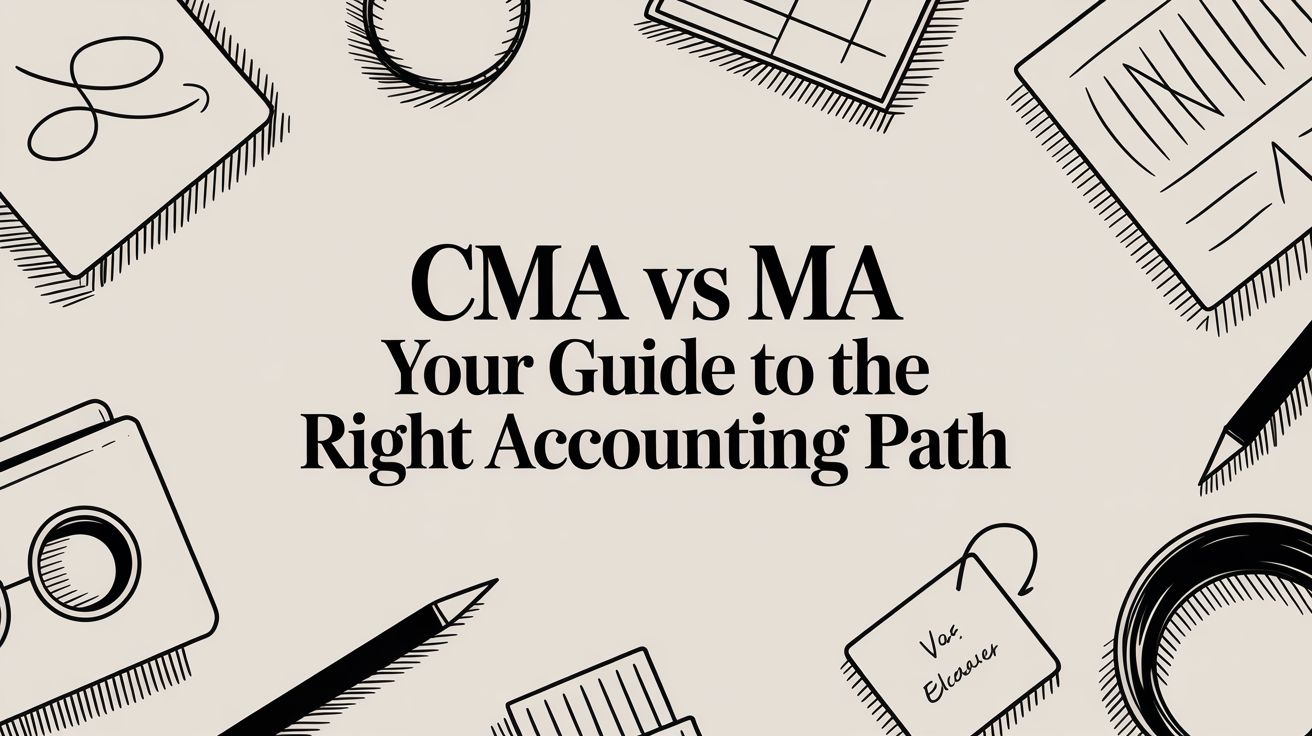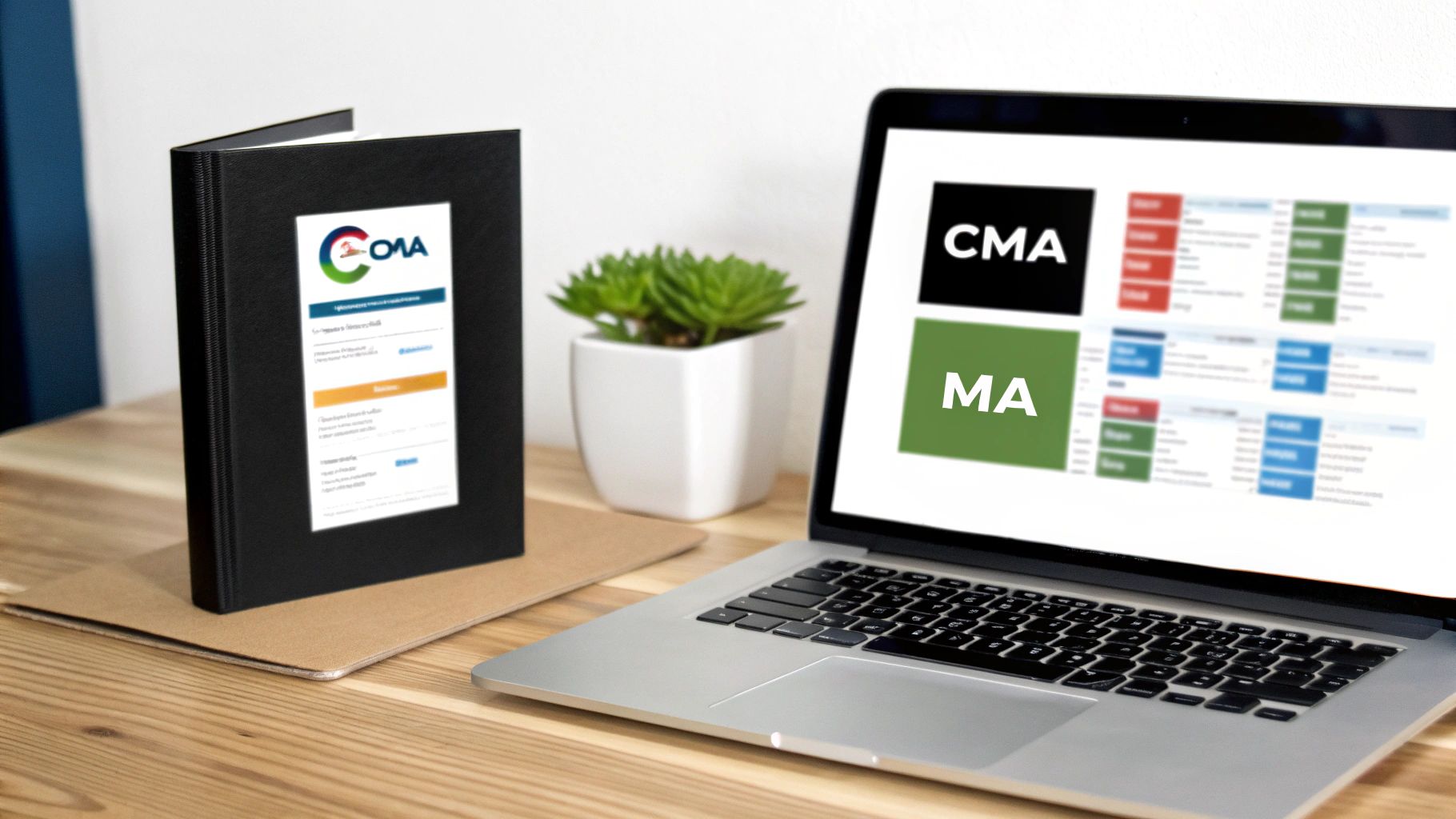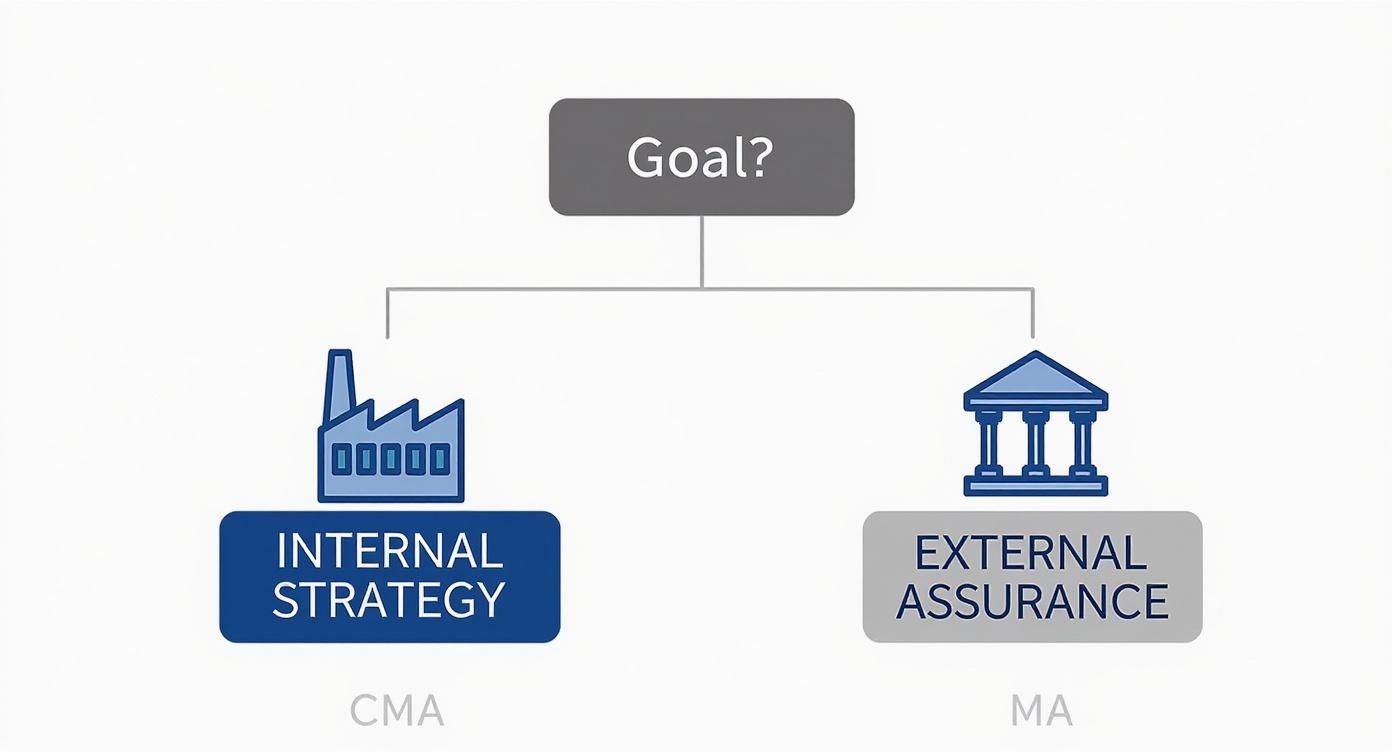CMA vs MA Your Guide to the Right Accounting Path

Deciding between a Certified Management Accountant (CMA) and a Master of Accounting (MA) comes down to a simple, yet profound, career question: Do you see yourself shaping financial strategy from within a company, or do you want to provide expert accounting assurance as an external expert?
The CMA is a professional certification built for strategic thinkers who want to work inside an organization. On the other hand, the MA is an academic degree that lays a deep technical foundation, often serving as the fast track to public accounting and earning a CPA license.
Understanding the Core Differences
Picking the right credential—CMA or MA—is a defining moment for anyone in finance and accounting. While both can lead to rewarding careers, they cultivate very different skill sets and open completely separate doors. It's not about which one is "better," but which one fits your long-term goals.

Here's a straightforward breakdown:
- The CMA Path: This certification is for professionals who want to be seen as strategic business partners. The curriculum is all about decision analysis, financial planning, and performance management—the exact skills you need to guide a company’s financial health from the inside.
- The MA Path: As an academic degree, the MA delivers a deep and broad education in technical accounting. Think auditing, taxation, and financial reporting. It’s the traditional stepping stone for becoming a Certified Public Accountant (CPA) and building a career in public accounting or corporate compliance.
CMA vs MA At a Glance
Sometimes the best way to see the difference is a side-by-side comparison. This table cuts through the noise and lays out the core distinctions between the two paths.
| Attribute | Certified Management Accountant (CMA) | Master of Accounting (MA) |
|---|---|---|
| Type | Professional Certification | Academic Graduate Degree |
| Primary Focus | Internal strategic management, corporate finance, and decision support. | External financial reporting, auditing, taxation, and compliance. |
| Governing Body | Institute of Management Accountants (IMA) | Various accredited universities and academic institutions. |
| Core Skills | Financial planning, performance analytics, risk management, and strategic thinking. | GAAP/IFRS standards, audit procedures, tax law, and financial statement analysis. |
| Typical Career | Financial Analyst, Controller, FP&A Manager, CFO. | Public Accountant, Auditor, Tax Specialist, Forensic Accountant. |
| Primary Goal | To drive internal business performance and strategy. | To ensure financial accuracy and regulatory compliance. |
Thinking about how different credentials boost your career is a smart move. To get a better handle on the long-term benefits of earning a certification, you might find it helpful to read about the value proposition of professional certifications. This wider perspective can help you place the CMA vs. MA decision into your overall career strategy.
What Is a Certified Management Accountant (CMA)?
The Certified Management Accountant (CMA) is a highly respected global credential for accounting and finance experts working inside a business. It’s a certification that signals you’re not just a number-cruncher, but a strategic partner who can guide major business decisions.
Overseen by the Institute of Management Accountants (IMA), the CMA validates your skills in critical areas like financial planning, performance analysis, and cost management. It also places a heavy emphasis on ethical decision-making, which is a cornerstone of the profession.
Unlike other accounting credentials that focus on external auditing or tax compliance, the CMA is all about driving internal strategy. It trains professionals to analyze performance, keep costs in check, and give executive leaders the insights they need to move the company forward.

This internal focus is really what separates the CMA vs MA. A Master of Accounting (MA) degree often sets graduates up for careers in public accounting firms. The CMA, on the other hand, sharpens the specific skills needed for high-impact corporate finance roles, like financial analyst, controller, or even Chief Financial Officer (CFO).
The CMA Exam Structure
Getting the CMA designation means passing a challenging two-part exam. It's designed to be comprehensive, covering a wide range of management accounting and financial management topics to ensure you're ready to create value from day one.
The exam is broken down into two distinct parts:
- Part 1: Financial Planning, Performance, and Analytics. This first section is all about the nuts and bolts. It tests your knowledge of external financial reporting, how to manage costs effectively, internal controls, and leveraging technology and analytics to get the job done.
- Part 2: Strategic Financial Management. The second part shifts to big-picture thinking. It covers corporate finance, risk management, investment decisions, and how to analyze complex scenarios to make the right call for the company's future.
Think of it this way: the CMA isn't just an accounting certification; it's a strategic business credential. It tells the world you can turn raw financial data into clear, actionable intelligence that a management team can rely on.
This isn’t just a U.S.-based credential, either. The IMA notes that the CMA is recognized in over 150 countries, including major economies like China, India, and across the Middle East. For more on its global reach, cmacoach.com offers some great perspectives.
Career Impact and Core Competencies
Earning your CMA is a powerful statement. It shows employers you're dedicated to mastering the skills that help businesses not just survive, but grow.
If you’re curious about the specific career paths and skills involved, our complete guide on what a CMA is breaks it all down. At its core, the certification tells employers you have the advanced ability to connect the dots between accounting insights and strategic business goals.
Understanding the Master of Accounting (MA)
While a CMA builds strategic skills for roles inside a company, the Master of Accounting (MA or MAcc) carves a different path. This is a graduate-level academic degree, and it's all about building deep, technical expertise in the core pillars of accounting: financial reporting, auditing, taxation, and compliance.
Think of it this way: an MA program isn't focused on shaping future business strategy. Instead, it’s about guaranteeing that a company's past and present financials are completely accurate. The curriculum is a deep dive into Generally Accepted Accounting Principles (GAAP), International Financial Reporting Standards (IFRS), complex tax codes, and meticulous audit procedures. The goal is to produce specialists who are the guardians of financial integrity.

The Academic Pathway to CPA and Public Accounting
For a lot of aspiring accountants, the main reason to get an MA is simple: it’s the clearest route to becoming a Certified Public Accountant (CPA). Most states demand 150 credit hours of education before you can even sit for the CPA exam, but a typical bachelor's degree only gets you to 120.
An MA degree is the perfect way to close that 30-hour gap. It provides the advanced coursework needed and, at the same time, preps students for the notoriously difficult CPA exam. This makes the MA the traditional, go-to path for anyone aiming for a career in public accounting, particularly at one of the big firms.
An MA degree is the bedrock of a career in external assurance. It equips graduates with the technical precision needed to audit financial statements, prepare complex tax returns, and ensure a company is compliant with all relevant regulations.
Core Curriculum and Career Foundation
Where the CMA is forward-looking, the MA curriculum is grounded in established standards and regulations. The coursework is intense and laser-focused on developing technical mastery.
Here’s a look at what you’ll typically study:
- Advanced Financial Reporting: This is where you master the fine points of creating accurate and compliant financial statements for investors, lenders, and other external parties.
- Auditing and Assurance Services: You'll learn the procedures, ethics, and critical thinking required to independently verify a company's financial records.
- Federal Taxation: This involves gaining an expert-level understanding of corporate and individual tax law, plus strategies for compliance.
- Accounting Information Systems: You'll analyze the systems used to capture, store, and report financial data, ensuring they are both secure and effective.
This rigorous academic foundation sets graduates up for roles where precision and following the rules are everything. While the CMA vs MA debate ultimately comes down to your career goals, the MA is the undisputed credential for anyone wanting to become an expert in external reporting and public accounting. It's the degree that creates the auditors, tax specialists, and compliance officers who keep the financial world in check.
Comparing Curriculum and Skill Development
The real difference between a CMA and an MA comes down to the kind of professional each path is designed to create. While both deal with the world of finance, they build entirely different experts. The CMA certification is all about creating a strategic business partner, while the MA degree is focused on producing a technical specialist rooted in compliance and reporting.
Think of it this way: the CMA curriculum is laser-focused on internal decision-making. It intentionally skips the nitty-gritty of external audit procedures and complex tax codes. Instead, it’s all about building the skills that help an organization look ahead, strategize, and grow from within.
The CMA Strategic Focus
The CMA exam is built on two main pillars: performance analytics and strategic financial management. This isn't by accident. The structure is designed to make sure a CMA can do more than just report on past performance; they can use that data to give solid advice on what the company should do next.
A CMA's core skills include:
- Performance Management: Digging into operational metrics to find areas for improvement, get costs under control, and ultimately boost the bottom line.
- Risk Management: Spotting financial risks that could threaten the organization and creating smart strategies to handle them.
- Investment Decision Analysis: Sizing up capital projects and other investment opportunities to make sure they fit the company's goals and will deliver a good return.
The CMA forges a professional who speaks the language of both finance and business operations. They are trained to connect financial data directly to strategic outcomes, acting as an internal consultant to leadership.
The MA Technical Foundation
A Master of Accounting, on the other hand, is built around external reporting and compliance. The main goal here is to produce experts who can guarantee a company’s financial statements are accurate, clear, and follow all the necessary legal and regulatory rules.
This path is less about strategic thinking and more about technical perfection. The coursework is incredibly detailed and precise, drilling down into established rules and frameworks.
MA programs typically concentrate on:
- Advanced Auditing: Mastering the processes for independently checking financial records and internal controls.
- Complex Taxation: Developing an expert-level grasp of corporate tax law and all its compliance demands.
- Financial Reporting Standards: Becoming fluent in GAAP and IFRS to prepare financial statements for investors, creditors, and government agencies.
The CMA exam's difficulty is well-known, with a global pass rate that sits around 45-50% for each of its two parts. On top of that, candidates need a bachelor's degree and two years of relevant work experience, which ensures the certification is a blend of academic theory and real-world practice. You can explore more about these certification requirements to see how this structure holds up.
Let's break down how this focus translates into the specific skills you'd develop on each path.
Skill Development Focus CMA vs MA
| Skill Area | CMA Emphasis (Strategic & Internal) | MA Emphasis (Technical & External) |
|---|---|---|
| Financial Planning & Analysis | Forward-looking budgeting, forecasting, and performance variance analysis to guide internal strategy. | Historical data analysis, financial statement preparation, and ensuring compliance with reporting standards. |
| Decision Support | Cost-benefit analysis, capital budgeting, and pricing decisions to drive profitability and growth. | Focuses on providing accurate data for external stakeholders (investors, lenders) to make their own decisions. |
| Risk Management | Identifying and mitigating internal operational and financial risks; enterprise risk management (ERM). | Primarily concerned with audit risk and ensuring compliance to avoid legal and regulatory penalties. |
| Regulatory Knowledge | Internal controls (SOX), corporate governance, and ethical frameworks from a management perspective. | Deep expertise in GAAP, IFRS, and specific tax codes to ensure accurate external reporting. |
| Communication Focus | Translating complex financial data into actionable insights for non-financial managers and executives. | Formal, structured communication through financial statements, audit reports, and regulatory filings. |
In the end, this is what it boils down to: each program develops a critical, yet distinct, skill set.
Ultimately, the choice comes down to the professional identity you want to build. The CMA curriculum develops a strategic advisor who uses financial data to shape the future. The MA curriculum molds a technical authority who guarantees the integrity of a company’s financial past and present. Both roles are absolutely vital, but they serve completely different functions in the business world.
Charting Your Career: Where a CMA or MA Can Take You
The decision between a CMA and a Master of Accounting isn't just about another line on your resume; it's about choosing which doors you want to open in the world of finance. Think of it this way: each credential sends a very different signal to potential employers about where your passions and skills lie.
A CMA tells the world you’re built for the inside game. It’s the go-to for professionals who want to sit at the decision-making table, helping to steer the company's strategy, not just tally up the results. You'll find CMAs thriving in fast-paced industries like manufacturing, tech, and healthcare, where smart financial analysis gives a company its competitive muscle.
The CMA Career Path: The Strategic Insider
Getting your CMA puts you on a trajectory toward roles that merge deep financial know-how with C-suite leadership. It's less about historical reporting and more about being a vital part of the management engine.
Here’s a look at where a CMA can lead:
- Financial Planning & Analysis (FP&A) Manager: You’re the one running the numbers for budgeting, forecasting, and answering the big "what if" questions that guide strategy.
- Controller: This is the nerve center of a company's accounting. You're in charge of everything from financial reporting to making sure the internal controls are rock-solid.
- Cost Accountant: Especially crucial in manufacturing, you're the expert at digging into production costs to find efficiencies and boost profitability.
- Chief Financial Officer (CFO): The top job. You're ultimately responsible for the entire financial health and strategic direction of the company.
A CMA holder is hired to be a strategic partner. They’re expected to answer the forward-looking questions: “Is this new product line a smart investment?” “How do we get our supply chain costs under control?” “What are the real financial risks if we expand into Europe?”
The MA Career Path: The Trusted Expert
On the other side of the coin, a Master of Accounting is the traditional launching pad for a career in public accounting and other external-facing roles. It positions you as a technical expert, the person who provides assurance that the numbers are right and everything complies with the rules. If you've got your eye on the Big Four or other major accounting firms, this is often the path.
MA graduates usually start in roles like these:
- Audit Associate: You work within a public accounting firm, poring over a company's financial statements to verify accuracy and compliance.
- Tax Specialist: You're the one who guides businesses and individuals through the maze of tax laws and handles their filings.
- Forensic Accountant: This is the detective work of accounting—investigating fraud and financial puzzles for legal or corporate cases.
- Government Auditor: You ensure taxpayer money is being spent correctly and efficiently by government agencies.
From there, many go on to become partners at their firms or transition into specialized corporate roles focused on internal audit or compliance.
While both paths can lead to a lucrative career, the core difference is simple. The MA is fundamentally about assurance—validating past financial performance. The CMA is all about shaping the company’s financial future. Your ultimate choice really comes down to which of those two missions—assurance versus strategy—gets you more excited.
How to Choose the Right Credential for Your Goals
Turning all this detailed analysis into a clear choice really comes down to a bit of self-assessment. The whole CMA vs MA debate boils down to one simple question: do you want to shape a company's future from the inside, or do you want to ensure its financial accuracy from the outside?
If the idea of driving strategy, improving performance, and directly influencing business operations gets you excited, then the CMA is your clear path forward. This credential is for those who see finance not just as a reporting function, but as a powerful tool for growth and creating a competitive edge.
On the flip side, if your passion lies in precision, regulation, and the absolute integrity of financial reporting, the Master of Accounting is the gold standard. It lays the technical groundwork for a career built on assurance, compliance, and public trust, and it’s a very common stepping stone for becoming a CPA.
The Deciding Factor: Your Professional Identity
Ultimately, your choice says a lot about the professional identity you want to build. Are you an internal strategist or an external expert? Think of it that way.
The core distinction is function: CMAs are strategic partners focused on internal performance, while MA graduates typically become technical specialists focused on external compliance. Choosing correctly means aligning the credential with your natural professional instincts and long-term career ambitions.
This decision tree gives you a great visual for the career paths that branch out from your primary goal, whether that's internal strategy or external assurance.

As you can see, a focus on being an internal business partner points straight to the CMA. A goal centered on external auditing and compliance? That's the MA track.
As you weigh these options, it's also smart to explore various online accounting course options to see what fits your learning style and career timeline. By keeping that core distinction in mind—internal strategy versus external compliance—you can confidently pick the credential that will not only boost your career but also genuinely align with what you love to do.
Common Questions About CMA vs. MA
When you're mapping out your career in finance, it's natural to have questions about which credentials will get you where you want to go. Let's break down some of the most common things people ask when comparing the CMA and a Master of Accounting.
Can I Get a CMA After Finishing a Master of Accounting?
You absolutely can, and it’s a powerful combination. Many people use their MA to build a strong technical accounting base—often as a stepping stone to the CPA exam—and then add the CMA to develop their strategic management muscles. The two credentials really do complement each other.
Think of it this way: the MA gives you the deep technical knowledge for financial reporting and compliance, while the CMA adds a layer of strategic business insight. This dual expertise makes you incredibly valuable because you can speak to both external reporting requirements and internal performance drivers.
Which One Leads to a Better Salary?
Both paths can lead to a great salary, but the way you get there is a bit different. An MA, especially when you pair it with a CPA license, typically opens doors to high starting salaries in public accounting or specialized compliance roles. In that world, your compensation often follows a more predictable track based on your experience and the size of your firm.
The CMA, on the other hand, often has its salary potential tied directly to corporate performance. While the starting pay might be similar to that of an MA graduate, CMAs who climb into senior roles like Controller or CFO often see their earning potential skyrocket through performance bonuses and equity that are linked to the company's bottom line.
Is the CMA or MA Better if I Want to Work Internationally?
If a global career is your goal, the CMA has a clear edge. The skills it focuses on—like strategic planning, management accounting, and financial analysis—are universal business principles that apply anywhere in the world. The CMA certification is officially recognized in over 150 countries, which makes it a truly portable and globally respected credential.
An MA is definitely a valuable degree, but its curriculum is often built around a specific country's accounting standards, like U.S. GAAP. While that's great for working in the U.S., you might need additional training or certifications to make a smooth transition into a role in another country with different standards.
Ready to create fast, accurate, and professional-grade CMAs for your real estate clients? Saleswise generates detailed reports in about 30 seconds, giving you the speed and data you need to win listings. Try it today at https://www.saleswise.ai.
